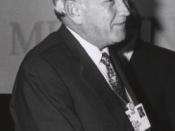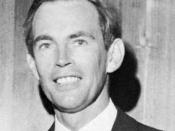It is evident that Athol Fugard's desire in his earlier years was to highlight the grievances and hardships of the Africans in the townships, rather than showcase his talent as a playwright. His plays were less about art and more about social action. His earliest plays, No Good Friday and Nongogo sought to enlighten the white South African public about the nature of the apartheid system. Rather than the plays being a form of art, Fugard's main goal was to highlight the nuances of the apartheid system and use the issues, ideologies and idiosyncrasies, elevating it to a level of art. In other words, theatre was Fugard's form of protest. His characters and ideas were used to effectively bring across his message.
In Fugard's two earliest plays, people from all angles of the apartheid system are presented. As a result of Fugard's portrayal of these characters, a clearer understanding of the system is created.
An exposition of the intimacies of reaction within the African townships is presented in the plays. We are introduced to and are able to observe the dreamers, workers, opportunists and white liberalists. Each serves a particular purpose and has a struggle peculiar to him or her. The dreamers show that the plight of the black man is a helpless one. In No Good Friday, Guy, a talented musician is unable to fulfill his dream of having a well paying job as a musician because the white employers are not interested in his music. He is only provided with the option to work as a kitchen boy. As a result he is 'blowing the sax on an empty stomach'. Even his friends seem uninterested in his dreams because they know that they are hopeless ones. When Guy finally gets a chance to have his own solo...


